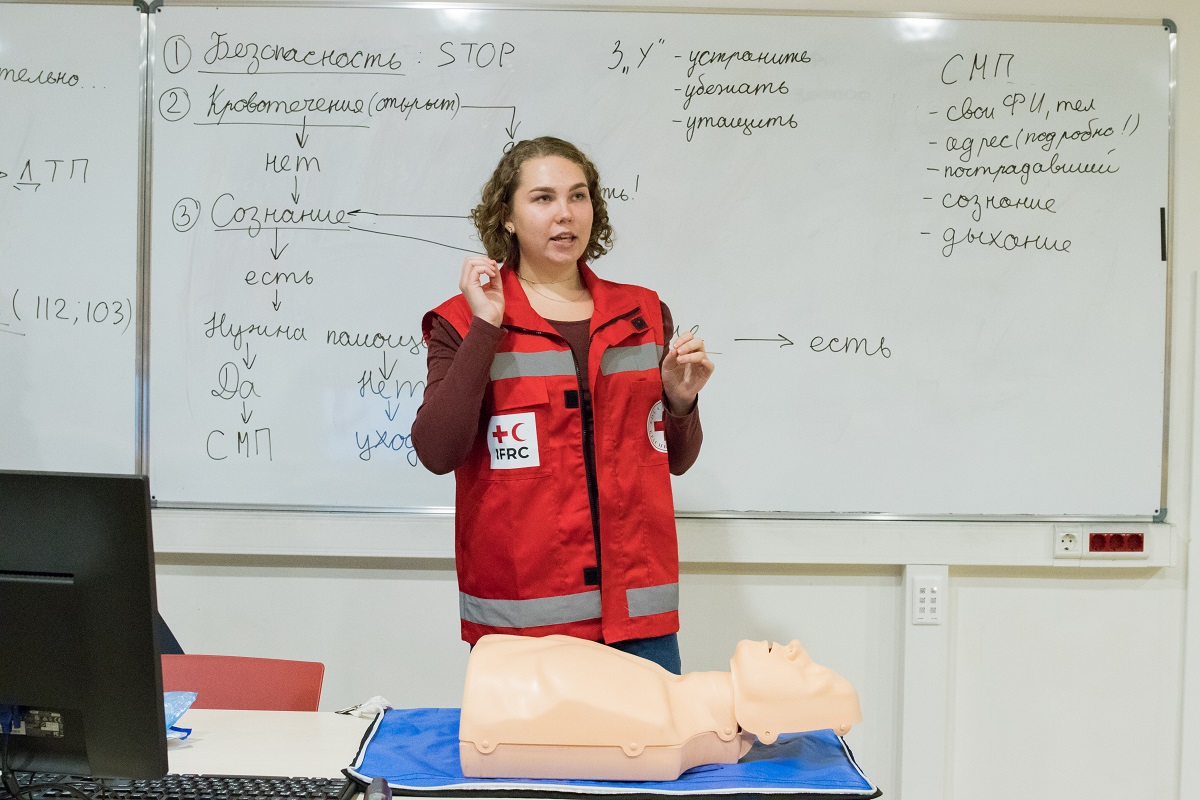‘When Ordinary People Administer Aid to Someone in Distress, It Lowers Mortality’
The HSE University Pokrovka Building is hosting a Safety Fair on February 6–8 and February 13. The event features master classes and seminars where students can find out what to do in emergencies: how to provide first aid to people in distress, what to do in the event of a fire, and how to stay calm in emergencies.
The Safety Fair has been organised by the HSE University Centre for Leadership and Volunteer Work and a group of enterprising students. As part of the event programme, invited experts reveal the proper behavioural practices for emergency situations, while representatives of the Russian Union of Rescuers, the Russian Red Cross, the HSE University Centre for Psychological Counselling and the HSE Fire Safety Office held a series of informative meetings.
On February 7, participants of the fair learned how to properly tie a bandage to stop bleeding, how to deal with someone who has lost consciousness, and what to do if a person’s breathing and heart have stopped. The participants tested out their new knowledge on the spot using training mannequins.
Anna Kurnosova of the Russian Red Cross shared that she herself has witnessed such situations several times in her everyday life. ‘I think everyone has encountered an emergency at least once. It can happen while we are on our way to university, to school, or riding the metro. People fall ill regularly,’ she explained, adding that the most commonly encountered incidents involve bleeding and loss of consciousness.
Anna Kurnosova

‘In the master class, we provide basic knowledge that is useful for the most common situations. People don’t remember everything, of course, but they remember the main points. Actually applying this knowledge in an emergency depends on how well a person can handle stress, assess the situation, and compose themselves.’
Alena Solonina

Alena Solonina, representative of the Russian Red Cross, has also encountered similar situations: ‘Someone had an epileptic seizure. He remained conscious, and I tried to follow the procedure to provide aid. I hope it helped him.’ She added that people need to attend such master classes regularly in order to constantly refresh and consolidate their knowledge. ‘Hopefully, you won’t have to put this knowledge to use,’ explains Alena. ‘But anything can happen. Often, by the time people are seen by doctors it is too late; this is because the victim did not receive first aid. These kinds of courses and master classes help to change this. When ordinary people can administer at least the minimum of aid to someone in distress, it significantly helps paramedics and reduces mortality.’
The HSE News Service spoke to visitors of the Safety Fair about their impressions:
Alexey Koshkin, 2nd-year student of the Master’s in Public Administration
I found it interesting and extremely useful to learn how to administer first aid in an emergency in order to minimise the negative consequences. I already encountered a situation in my life when such knowledge was useful.
Sofia Nikitina, 3rd-year student of the Bachelor’s in Philology
Coincidentally, I decided at the start of January that I wanted to do something new and take first aid courses. I looked at a lot of sites online, and many courses are not free. Then I came across a page for this event on Telegram and decided that it was for me! Everything was very useful. I think it is important for everyone to know how to administer first aid.
Maxim Makarov, 1st-year student of the Bachelor’s in Economics
I attended the lecture on emergency situations yesterday and the master class hosted by the Red Cross today because knowledge of first aid is very important. I personally have not been in an emergency situation, but have witnessed it. Fortunately, there was someone nearby who had the necessary skills to help the person who needed it.

